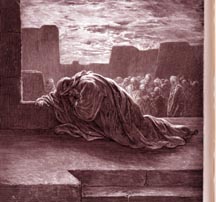Now that we are officially into the season of Lent, I wanted to write on something that would be beneficial to this Lenten season and really anytime we have sinned and are seeking forgiveness. As I was praying before Mass on Ash Wednesday, my next blog post was on my mind. I opened up my Daily Roman Missal and read that Psalm 51 was going to be the Psalm for the day and the two days to follow.
Honestly, I love this psalm! It’s by far one my favorite psalms in the Psalter. This psalm was always a favorite of mine, but after taking a class in graduate school on the Psalms with Dr. John Bergsma, this scripture text became even more fruitful for me. It’s the perfect psalm to begin the Lenten Season since its focus is on repentance and forgiveness.
Psalm 51, the Miserere, is one of the most popular psalms in the Psalter (prayed every Friday in the Liturgy of the Hours), yet it is also one of the most difficult psalms to pray because of it’s nature – it’s a song about sin and asking for forgiveness. It’s a prayer that focuses on guilt and God’s grace. I don’t know about you, but these are topics I tend to avoid because it’s hard to admit at times my own faults and sins.
Over the centuries, this psalm has been on the lips of many Jews and Christians seeking repentance for their sins, but historically, this psalm was more than likely composed by King David after he committed the sin of carnal knowledge with Bathsheba (the prophet Nathan called him out). In Psalm 51, we see David as the Repentant Sinner. Over the past two years teaching high school theology, at least one of my students understands the exact time this psalm should be recited for us Catholics – before or after receiving the Sacrament of Reconciliation.
In Psalm 51:1-2, David feels the magnitude of his guilt and is very sick from the sin he just committed. He prays fervently that God will not take his mercy from him – “Have mercy on me, O God, according to your merciful love, according to your abundant mercy blot out my transgressions. Wash me thoroughly from my iniquity, and cleanse me from my sin!”
Now it should be understood that term mercy is translated in the Hebrew as hesed (covenant love/fidelity). I spoke about this term in the reflection on Psalm 41. David is hoping that God will not take away his hesed from him. If you replace the term hesed or covenant love for the word mercy the entire two verses completely change – try it now. David does not want God to take away the love that he established with him when he formed the covenant in 2 Samuel 7. David is fearful that God will remove his hesed from him. Those of you that are familiar with the words that a priest says in Mass before the Consecration should know verse 2 very well – “wash me of my iniquity and cleanse me from my sin.” He says this as he is washing his hands just before he consecrates the bread and wine into the Body and Blood of Jesus Christ.
In verses 3-6, David continues to ask for repentance. He is aware of his sins and clearly sees them. It’s not just the sin with Bathsheba that is the issue, but that he has offended the hesed that God has given to him. In verse 5, David speaks of the sin he was conceived in. As Christians, we clearly see this at the doctrine of original sin that is taught by the Church. David is fully aware that God has given him the intellect to know that he has sinned and the ability to confess his sin and make amends.
In Verses 7-9, David continues to ask for forgiveness and to be healed of the illness that has overtaken his life. Now there is an interesting statement in verse 7 – “purge me with hyssop, and I shall be clean.” A hyssop was a brush like branch that grew in the Middle East. The Israelites used the branch to spread the blood of the lamb on the doorposts before the Death of the Firstborn (the last plague) in Egypt and it’s also used to lift up a sponge filled with wine to Jesus while he is on the cross. David is either using the branch to sprinkle water upon himself as a ritual cleaning or maybe he is using the branch as mortification and he is purging himself as penance for the sins he committed.
As Catholics we may no longer use physical mortifications as penance as much, but when we do our penance after the Sacrament of Confession, we are mortifying ourselves from the sins we just confessed. At times and depending on the severity our sins, this is very painful.
In verses 10-12, we see David seeking not only a physical healing from his sins, but he seeks an internal healing as well when he says, “Create in me a clean heart, O God, and put a new and right spirit within me.” He seeks God’s loyalty and wants a heart, a heart that is circumcised (Dt 30:6) and made new. Simply, he wants to remain in God’s presence! Blessed John Paul II says in his book, Psalms and Canticles, “The Psalm, however, was enriched in later centuries, by the prayer of so many sinners, who recovered the themes of the “new heart” and of the “Spirit” of God placed within the redeemed human person, according to the teaching of the Prophets Jeremiah and Ezekiel.”
For us a Catholics, after the Sacrament of Reconciliation, not only are we healed physically because our sins hurt the Body of Christ, but we are also healed internally and souls are made new. We walk out of the “Medicine Box” as saints!
In verses 13-17, David vows to make God’s ways known to all men. He desires to speak of God and to praise him in all that does, even in the face of those who despise him. After committing this terrible sin, David seeks to do contrition. As Catholics, we say an Act of Contrition in the Sacrament of Reconciliation to confess all that we have done, give praise back to God, and to avoid sin and the near occasion of sin. Just as David said his contrition to God, so must our contrition be said to God as well.
Verses 18-19 were more than likely added on at a later date during the rule of Nebuchadnezzar after the Temple had been destroyed and the city of Jerusalem set in ruin.
This is an important psalm that should be read and prayed more often, especially during the Lenten Season. I would encourage you to place these words on the lips of our Lord Jesus Christ while he suffers and dies for our sins on the cross. As I stated above, this is a great psalm when entering or exiting the Sacrament of Confession.
As Catholics, we should look to the great saint and Doctor of the Church, St. Augustine, who could have prayed this psalm many times during his conversion to the Catholic Church – “I know my fault; my sin is always before me…my sacrifice is a contrite spirit…a new heart create in me, O God…”
May this Lent be fruitful and filled with God’s blessings.
Categories: Scriptures









THIS HAS BEEN MY FIRST PRAYER OF THE DAY FOR YEARS. IT IS SO WONDERFUL TO HAVE IT, AND TO START MY DAY ASKING FOR GOD’S MERCY ON MY LIFE DURING THE DAY. TO ME PSALMS 51 IS EVERYTHING I DESIRE TO GIVE TO GOD, AND EVERYTHING I NEED FROM HIM FOR MY LIFE. THANKS FOR POSTING THIS POST REGARDING THIS GREAT PRAYER OF DAVID. GOD BLESS, SR
Two interesting things that I learned here. 1) That the hesed that David is speaking of is specifically God’s hesed to the Davidic covenant. I had never thought to ask which hesed the Psalmist was talking about. 2) I didn’t know anything about hyssop.
I did have one quick question. When did it come about that Catholics couldn’t use corporeal mortification? Not that I use it myself, but I was under the impression that many in Opus Dei still used corporeal means of mortification under the advice of their spiritual director.
In regards to corporal mortification, I was under the impression that it wasn’t used much anymore and that’s how I stated in the post. I didn’t know that Opus Dei still used a means of it under the advice of their spiritual director. If you know any Opus Dei priests or lay faithful that could enlighten us on the subject, please share my post with them. Maybe they can explain to us how they use it in their spiritual life. Foolishly, a few years ago, I tried mortification during Lent. I stopped the day after Ash Wednesday and realized that my spiritual life was by no means ready for this yet.
Thanks, Tom! I know that Dr. Hahn wrote a book about Opus Dei (which is on my shelf, but has never been read). My info about them came from their own FAQ at http://www.opusdei.us/sec.php?s=494. Here is the quote from the web site…”as recommended by the Catholic Church, members practice small physical mortifications occasionally, such as giving up certain items of food or drink. Within this spirit, numeraries and associates (celibate members) sometimes practice traditional Catholic penances such as using the cilice and discipline. These are practices that Catholics have used for centuries and are commonplace in the lives of the saints, for example: St. Francis of Assisi, St. Thomas More, St. Therese of Lisieux, St. Padre Pio and Blessed Mother Teresa. The motivation for these voluntary penances is to imitate Christ and to join him in his redemptive sacrifice (cf. Matthew 16:24), and they can also be a way to suffer in solidarity with the many poor and deprived people in the world.”
Thanks Matt for posting that from the website. In regards to Psalm 51 and the possible mortification he committed, I was thinking that his mortification was more physical than just giving up certain foods or drinks. I know the Saints have performed corporal mortifications like whipping themselves. I looked in the Catechism of the Catholic Church and there is nothing that I could find on the subject. Paragraph 2015 speaks of mortification but in a very general way. It would be great to get an Opus Dei member to give us some insight on the matter.
I agree. It would be nice to actually get perspective with corporal mortification.
With regard to my last blog post…their web site refers to the cilice and discipline. The cilice is a fancy name for a hairshirt. The discipline is a fancy name for the whip that they use for corporal mortification. So, at least according to the FAQ, a small number of people in Opus Dei still use it. But, I’ve never really met anyone who has outside of a Dan Brown novel (or inside of one, since I don’t like wasting my time with such rubbish).